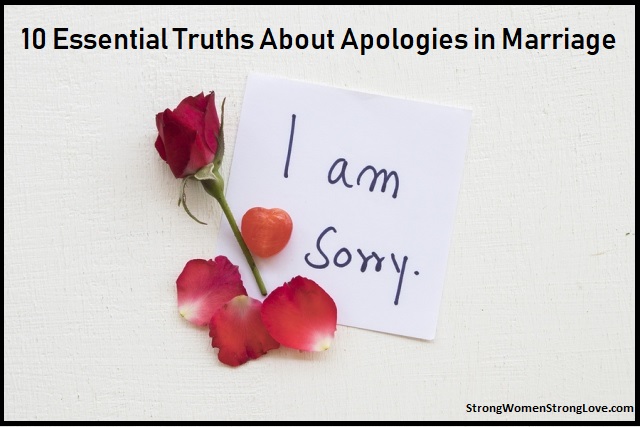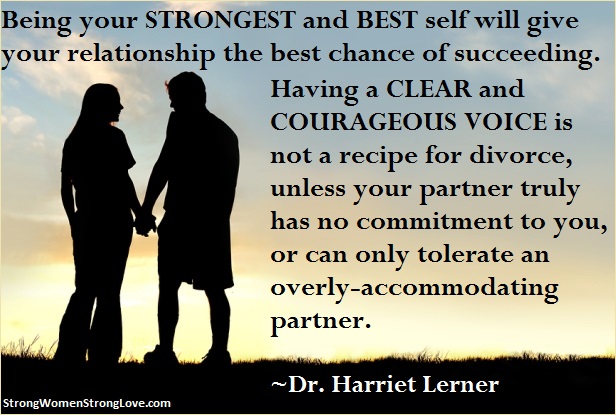by Strong Women Strong Love | Feb 19, 2019 | Persistent Pressures |

What messages did you get about anger when you were growing up? I bet you heard statements like these:
- Girls shouldn’t get so mad.
- Don’t curse. It isn’t very ladylike.
- Guys don’t like angry, bitter women.
- Calm down. You’re being so dramatic..
The people who instilled this kind of thinking in us weren’t doing us any favors. Misconceptions about anger and a lack of healthy strategies for dealing with anger can damage your relationship. So, let’s get a fresh perspective on this intense emotion that you might fear and avoid.
When Anger Goes Wrong
Far too many women think anger is telling them something negative about themselves. Thanks to what they learned from their families of origin and our culture, they fear deep down that anger means they’re a bad, aggressive person. They believe that if they could just be “better” somehow that they wouldn’t get angry.
These beliefs lead to …
- Tolerating behavior that makes you feel disrespected (for example, your husband habitually runs late) or even behavior that harms your family (like overspending).
- Avoiding conflict at all costs. Never having an argument doesn’t improve your marriage. In fact, the opposite can happen if you are sweeping issues under the rug.
- Seething silently in resentment. In many marriages, women build up resentments around housework and emotional labor.
- Withdrawing and becoming depressed. This happens when you lose any hope of getting your needs met.
- Complaining. Complaints do give voice to your anger, but in a way that’s unlikely to get your husband to change what’s making you angry.
- Mean-spirited venting with friends. Again, this might feel like you’re doing something with your anger. But you’re actually just cultivating contempt for your husband while avoiding the real issues.
- We all have a breaking point. If you suppress anger long enough, you’re likely to lash out. When that happens, your words will be a lot more hurtful than the ones you would have chosen if you’d addressed your anger earlier.
How Anger Can Help You
You may not realize that anger doesn’t have to result in screaming and wounded feelings. It can actually help you improve your relationship. Anger also isn’t some indication of your character, or lack thereof.
The very wise psychologist and author Harriet Lerner recommends viewing anger as a warning signal. It reliably tells you when something is wrong and you need to take action to protect yourself.
To use anger in a positive way, first notice how you react when you notice angry feelings surfacing. If you tend to judge yourself (“Ugh, I shouldn’t be such a bitch”) or push your anger down (“No time to feel that now!), see if you can just let yourself feel the emotion without trying to judge it or squash it.
Instead of recoiling from your own anger, tune in and ask yourself what your anger is trying to communicate to you. Some common messages behind anger include:
- Your needs aren’t being met.
- You are being disrespected.
- You are doing too much.
- Someone has crossed a line with you.
When you have a handle on what’s causing your anger, you can act on it in a more effective way and use your anger as catalyst for positive change. For example, you can establish or affirm healthy boundaries around what you will do, how much you will give and what you will tolerate. You can lovingly but firmly stand up for what you need and what you expect.
Read More About Women and Anger
I won’t lie to you: While embracing your anger is liberating, it can also be an uncomfortable journey. All of those early messages are deeply ingrained in our minds, and our society still has some deeply messed-up attitudes about women and anger. To aid you in this work, I recommend Lerner’s book The Dance of Anger, as well as my own book, Strong Women, Strong Love.
by Strong Women Strong Love | Apr 1, 2018 | Books, Passionate Partnership |

In my last post, I talked about the importance of repair in your relationship. All couples go through conflicts, misunderstandings, and hurt feelings, and it’s very important to resolve them.
One of the tools you need in your relationship repair kit is the ability to give and accept an apology. Apologies are so important that renowned psychologist and relationship expert Harriet Lerner devoted an entire book to the subject: Why Won’t You Apologize? Healing Big Betrayals and Everyday Hurts. This book is required reading for strengthening your marriage, not to mention all the other relationships in your life.
Adapted from Lerner’s work, here are 10 essential things you should know about apologies:
- Apologizing well requires listening deeply to the person you hurt. Your apology should begin by fully understanding their feelings and experience, no matter how difficult they are for you to hear.
- A good apology also requires taking responsibility. A hurt person wants you to carry some of the pain of the situation with him. She also needs assurances that the same situation won’t happen again.
- A bad apology can make things worse than no apology at all.
- Common mistakes people make when apologizing include: making excuses, over-explaining, blaming the other person for your mistake, and bringing up things the other person did wrong in the past.
- A consistent failure to apologize harms a relationship, even if things are otherwise good. When both partners have the ability to apologize, the relationship is stronger and healthier.
- An apology doesn’t have to be the last word on a situation. Think of it as opening the door to future communication.
- In situations where the hurt runs very deep, an apology isn’t a one-time event. At these times, you must commit to ongoing listening and repair of your relationship.
- Apologizing when you’ve caused deep harm requires a strong sense of your own self-worth. Without it, you’re more likely to be defensive by doing things like minimizing, rationalizing and denying the pain you have caused.
- If your partner fails to apologize to you, that’s typically an indication of his low self-worth, not that he doesn’t love you.
- You don’t have to rush to forgiveness after an apology. In fact, doing so can cut short your healing process. Forgiveness also doesn’t have to be total for your relationship to move past the issue.
I encourage you to be quick to offer sincere apologies to your husband. Also, be receptive to his sincere efforts to make amends. If either partner’s failure to apologize is a trouble spot in your marriage, make it a priority to explore Lerner’s work together.
by Strong Women Strong Love | May 1, 2016 | Passionate Partnership, Personal Power |

As women, we’re constantly bombarded with messages about the importance of being attractive. Constantly.
Usually, those messages center on our appearance. How many times have you seen advice about how to get a “bikini body,” dress to seduce or “turn back time,” so you can look younger?
The hope is that if you do these things, you won’t have any trouble stoking the fires of attraction and keeping them burning, right?
Right, if you want a short-term, purely physical attraction. Wrong, if you’re trying to create the kind of attraction that lasts a lifetime.
So what can make you attractive to your husband decade after decade? Hint: Getting a new haircut or wearing sexy lingerie might be nice, but probably won’t turn his head forever.
Let me give you a formula to try (and it doesn’t require starving yourself, getting a personal stylist or undergoing cosmetic procedures).
(SELF-WORTH + RELAXED AUTHENTICITY) + LOVING ACTION = IRRESISTIBLE ATTRACTION
Here’s why that formula works — and why it doesn’t mention a bikini body.
The truth is that if you’re feeling desire wane in your marriage, it’s probably not because your husband’s physical attraction to you has decreased dramatically.
What’s going on instead is likely a decline in the emotional connection between the two of you. Because we often rely heavily on our partners to get our emotional needs met (that’s especially true of men), the nature of that emotional bond is critical.The deep attraction that sustains a marriage isn’t about what catches your eye in the club or on a dating app. It depends on two very important things: having a strong sense of self AND creating a loving connection with your husband.
- STRONG SELF: It’s important to have a sense of self separate from your partner. That’s why the first part of the formula is about you — valuing yourself, being comfortable in your own skin, treating yourself as if you matter, and letting your husband know what you need. It’s about engaging what truly makes you feel alive, showing up as yourself, and drawing a line when others don’t respect you. It’s being playful, confident, and engaged in your own life. As therapist Esther Perel has so eloquently noted, distance, space, and mystery stoke the fires of attraction. Be yourself, enjoy doing your own thing, and you’ll amp up the attraction in your relationship. If you’re not convinced, ask yourself how attracted you would be to your husband if he was really needy and had no life outside you! Not much, I bet.Remember the wise words of Dr. Harriet Lerner:
Being your strongest and best self will give your relationship the best chances of succeeding. Having a clear and courageous voice is NOT a recipe for divorce, unless your partner truly has no commitment to you, or can only tolerate an overly-accommodating partner.
- LOVING ACTION: How you interact with your husband is also a huge part of whether he feels attracted to you. Most of us love to be around someone who makes us feel good about ourselves — someone who likes us and is good to us. When you treat your partner in ways that let him know you want him, that he matters to you, and that you’re glad he’s in your life, he’s going to be a whole lot more interested in you! For real intimacy to develop in a marriage, we have to cultivate emotional safety, deep understanding, and presence on a regular basis. No one is going to open up if you’re distracted or if they’re worried you might criticize them. Let your actions show that you revere your spouse, and watch him become more vulnerable, trusting, and irresistibly drawn to you.
Try out my attraction formula, and let me know what happens. You can also learn about keeping a strong connection with your husband even during with a busy, overscheduled lives in my book Strong Women, Strong Love.
by Strong Women Strong Love | Apr 11, 2015 | Personal Power, Quotes |

Being your strongest and best self will give your relationship the best chance of succeeding.
Having a clear and courageous voice is NOT a recipe for divorce, unless your partner truly has no commitment to you, or can only tolerate an overly-accommodating partner.
~Dr. Harriet Lerner
by Strong Women Strong Love | Apr 1, 2015 | Poisonous Patterns |

I’m going to give you some marriage advice that seems counterintuitive, but I promise it’s not an April Fool’s Day prank.
Here it is: If there’s something you want or want more of in your marriage, don’t chase after it intensely. The things that we tend to do instinctively when we’re trying to get something from our partners are often what keep us from getting what we want. Here are a few examples of what I’m talking about:
- Love me like you used to. Let’s say you feel like intimacy in your marriage is going downhill. You decide to deal with this head on and have numerous discussions with your husband about how you feel like he doesn’t love you as much anymore. You disclose how lonely you feel in the relationship and give him numerous examples of ways he’s becoming more distant. You push him to change and hope that having this detailed conversation will motivate him to come emotionally closer. Instead, he gets defensive and shuts down.
- Do your fair share. Or, perhaps you’re overwhelmed and exhausted managing all the responsibilities at home. You repeatedly let your husband know that he really needs to help more around the house. It’s unfair that he doesn’t do his part. He never unloads the dishwasher. He won’t pick up after himself. He rarely takes the baby to daycare and doesn’t stay up with her if she wakes up at night. You really need him to start pulling his own weight, so you give him feedback about the changes that need to take place. Instead of jumping in to do his fair share, your husband storms off, mad that you think he’s such a “loser.”
- Do it this way. One final example. Let’s assume you’re very responsible and always pay the bills as soon as they arrive. Your husband just makes sure they are in by the due date. You always end up paying the bills because you think it’s important to take care of them before you forget. After a while, you start to feel resentful and tell your husband it’s not fair that you’re stuck handling the bills every month. You insist he take over this job and try to show him a foolproof system you’ve developed to track all bills. You even offer to work together the first month so he can understand how you do things. He tells you to stop controlling him and refuses to even look at the bills.
In each of these scenarios, there is a legitimate problem that needs to be addressed. The woman’s approach is to be open, direct, and persistent with her husband, making sure he clearly knows her feelings. You should let your husband know when something is bothering you, even if he doesn’t want to hear it, right?
Yes, but not necessarily in the way you think.
Dealing with problems that cause resentment is absolutely critical to the long-term health of your marriage, but your approach matters tremendously too. If you’re trying to motivate your husband with an intense, “you’re not going to ignore this anymore” approach, it may backfire, especially if there’s a tone of blame. Make sure you’re not unintentionally communicating that he’s not good enough, otherwise he’ll feel attacked. If you don’t anticipate how your message will be received, communication may shut down rather than open up. Instead of getting closer, the two of you may drift further apart. Don’t sweep real problems under the rug, but be aware of how your husband may react to what you say.
Rather than chasing your husband down with complaints and demands, increase the odds of getting what you need by using these strategies instead:
- Change yourself. Relationships are a dance and it does take two to tango. If you change your steps, your partner will have to change his as well. So, take a look at how you may be contributing to the problems that exist. Are you taking on too much responsibility? Maybe you should back off and give your husband a real chance to step up more than he currently does. Do you insist on things being done your way? Perhaps you need to practice letting things go. What can you do to get things moving in a healthier direction?
- Be constructive. Rather than criticizing or blaming him, tell your husband how you’re feeling and what you need from him. Try something like: “I’m so overwhelmed by work and all the things that have to get done around the house. I feel on edge all the time and I hate feeling this way. Could we please work together to get the level of stress down? For example, I’m thinking it would be helpful if we could take turns being responsible for dinner.”
- Value him. If your husband does not feel valued while being given feedback, he will resist any efforts at change. All of us are much more likely to be cooperative when we feel respected and affirmed.
Backing off on chasing is of greater importance than you may realize. In technical terms, the pattern in which one spouse wants to confront the issue and the other withdraws from such a discussion is the pursuer/distancer pattern. E. Mavis Hetherington’s landmark study of 1,400 divorced individuals found that couples who routinely related this way had the highest risk of ending up divorced. For the sake of your marriage, it’s really important to change this pattern if it’s showing up in your marriage repeatedly.
Any time it feels like you are intensely chasing something in your relationship, it’s a sign that something is out of whack — and that you’re not on the right path to fix it. Try doing the opposite of what comes naturally, and you’ll often find yourself closer to where you need to be. When you feel like telling him off, calm down and approach him gently. If you’re frustrated that he can’t see what you need, ask him for help. If you find yourself wanting to convince him that your way is best, back off and leave room for his way. Although stopping your knee-jerk response can feel unnatural, it is how you make real changes in a relationship.
If you think you fall into the pursuer/distancer pattern and want to learn more, I recommend the book The Dance of Intimacy by Harriet Lerner. You can also learn more effective strategies for getting what you want in your relationship in my own book Strong Women, Strong Love. Just remember that chasing is always a fool’s game.
Don’t forget to subscribe to receive new blog posts HERE and get a free report, “10 Easy Ways to Get Him to Listen.”






